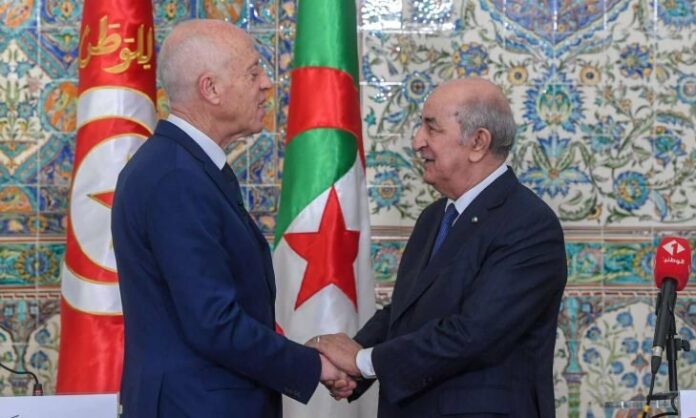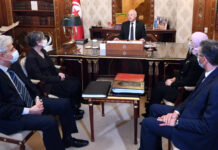In the post-“Arab Spring” era, Tunisia has turned into a battleground for control and influence between two axes, which represent interests, aspirations and connections: the first includes Turkey and Qatar in alliance with the “Muslim Brotherhood” represented in Ennahda Movement, while the second includes France, Egypt, the UAE and Saudi Arabia to a lesser degree.
Tunisia formed a fertile ground for the Turkish ambition, which some denounce and call “expansion.” With the removal of Ennahda’s leader Rached Ghannouchi from the institutional scene due to the “extraordinary measures” taken by President Kais Saied, Turkey’s loss will be the largest among the countries aligned in the two mentioned axes, due to the man’s impact on its position in the region.
Tunisian political sources say that during the era of the Ennahda, Tunisia turned into a supply base for the war front in Libya, based on the Turkish military role in the latter. Accordingly, the loss of the Tunisian tributary means a weakening of Ankara’s role, not only in the Maghreb and North Africa, but also in the eastern Mediterranean region, in which it is engaged in a conflict with the West in general and France in particular, to control the underground reservoirs of gas and oil fields.
Also, Turkey lost an important and promising economic market that the Tunisian parliament opened to Turkish businessmen, through laws and agreements, the latest of which was the “Encouragement and Mutual Protection of Investments in Tunisia and Turkey” agreement, which allowed them to own state assets. While Turkey’s exports have doubled, Tunisia exports to it no more than 4% of the total trade balance between the two countries, not forgetting the fact that in recent years Turkey has pumped huge sums of money into Tunisian infrastructure, in the form of sovereign debt owed by the Tunisian people. All this translated, in politics, into an increase in the Turkish political and administrative influence in Tunisia from the gateway to the economy, especially in light of the successive crises that the country suffered from, such as the retreat of the tourism sector and then, in particular, the “Corona” crisis.
Saied succeeded in transforming his battle against Ennahda from a battle of powers to a higher level linked to strategic policy.
On the other hand, the United States of America, along with the so-called “international community”, seemed to accept the changes brought about by Saied, which would bring relief to the man, as well as to the Arab countries that welcome his decisions, especially Egypt, Saudi Arabia and the UAE.
According to some sources, these countries, contrary to the accusations of the Ennahda Movement, are trying to invest in the new Tunisian situation, though they were not the ones who made the decision and the will to achieve it. The same sources add that Saied is trying to implement a purely internal Tunisian agenda, far from the policy of the axes, even though his steps were approved by the anti-“Brotherhood” axis in the Arab region, which began attempts to open channels of communication and coordination with Tunisia.
On the Algerian side, there seems to be some relief from what the Tunisian neighbor has witnessed, although caution remains in some respects. Algeria is located between Morocco (from the west), whose government is run by the Secretary-General of the “Justice and Development Party” (Brotherhood) Saad Eddine El Othmani (from the west), and Tunisia (from the east), whose institutions are controlled by the Ennahda Movemen”, in addition to the active and influential presence of Turkey and the “Brotherhood” in Libya.
This situation means, according to the same sources, completely encircling the Maghreb and North Africa, thus weakening Algeria in particular, by embargoing at times, and at other times by raising contentious files with neighboring countries. This is what the sources classified in the context of the Turks consolidating their influence and control, as these countries were the “pearl of the crown” of the Ottoman Empire in the seventeenth and eighteenth centuries AD.
In parallel, the visit of Israeli Foreign Minister Yair Lapid to Rabat, after the Othmani government adopted a decision last year to resume diplomatic relations with Tel Aviv, is inseparable from Ennahda’s evasion of the draft law criminalizing normalization in Parliament, which made several Tunisian parties and popular currents accuse it of preparing to append Tunisia to the ranks of the normalizing countries.
The sources believe that the “normalization” course that contradicts the Algerian steps, the latest of which was the Algerian parliament’s approval at the beginning of this year of a draft law criminalizing normalization with the Israeli occupation entity, is one of the reasons for the systematic attempts to strike Algeria. It seems that the balanced position shown by President Abdelmadjid Tebboune regarding the recent developments in Tunisia, may witness a greater adjustment in favor of the president versus Ennahda, in the context of an “Algerian move” that may be necessitated by developments to meet the Tunisian model/experience that Saied is now undertaking, after the completion of its maturity.











